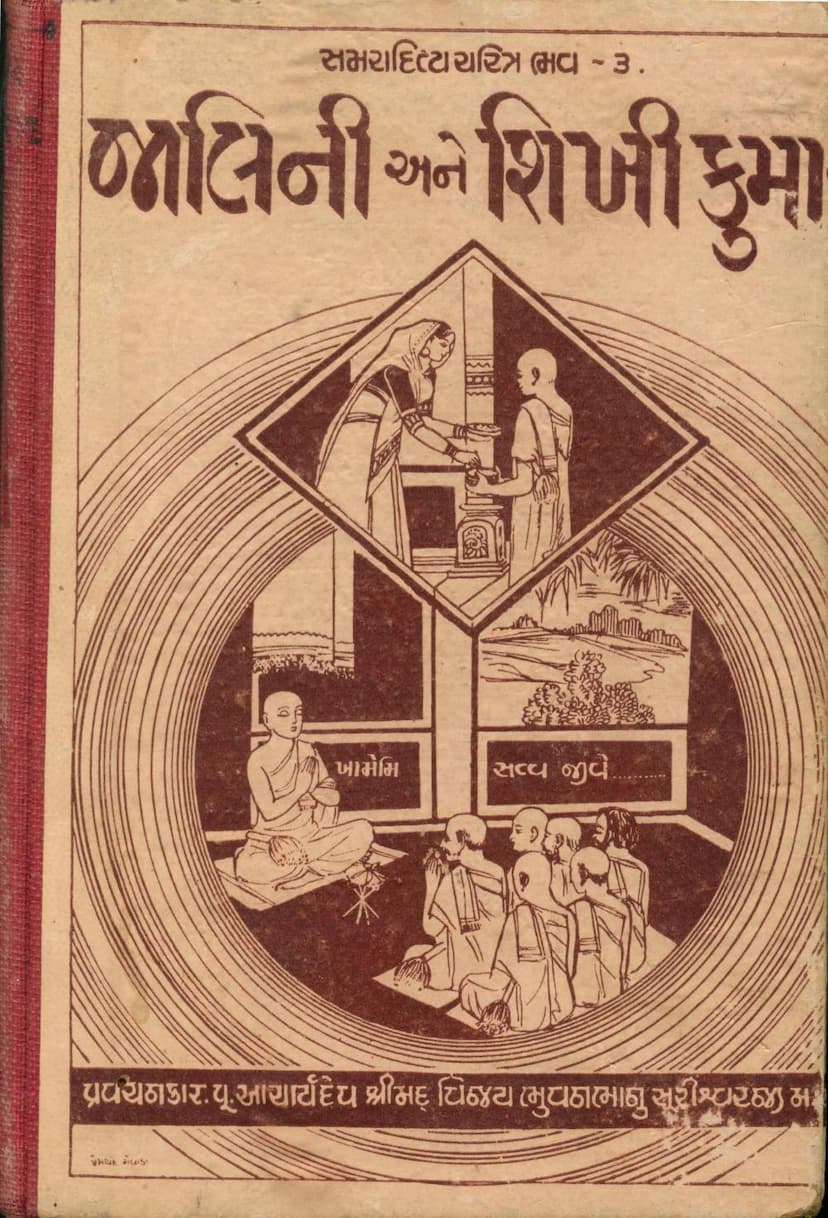Jalini Ane Shikhi Kumar
Added to library: September 2, 2025

Summary
Here's a comprehensive summary of the Jain text "Jalini Ane Shikhi Kumar," focusing on the provided pages and the essence of the content:
Book Title: Jalini Ane Shikhi Kumar Author: Bhuvanbhanusuri Publisher: Divya Darshan Karyalay Catalog Link: https://jainqq.org/explore/023311/1
Overall Theme:
The book "Jalini Ane Shikhi Kumar" is the third installment (Bhav-3) in the series "Shri Samaraaditya Kevali Charitra," authored by Acharya Bhuvanbhanusuri. It delves into the spiritual journey and karmic consequences of souls, specifically focusing on the lives of Jalini and Shikhi Kumar. The core message emphasizes the profound impact of love (vatsalya) in fostering growth and the destructive nature of hatred (ver). The narrative draws heavily from the epic "Samaraaditya Katha" by Acharya Haribhadrasurishwarji, highlighting the timeless wisdom embedded within Jain scriptures and the teachings of spiritual leaders.
Key Points and Chapters Summarized:
-
The Foundation of the Work: The book is presented as a compilation of discourses by the esteemed Acharya Shri Vijay Bhuvanbhanusurishwarji Maharaj, whose profound spiritual insights and eloquent delivery have inspired countless individuals. The publication is a tribute to Shresti Shri Nanachand Mulchand Kapalawala, facilitated by their family's support. The editorial work was diligently carried out by Muni Shri Rajendravijayji M. Shri and Muni Shri Narchandravijayji M. Shri.
-
The Central Theme: Vatsalya vs. Ver: The text powerfully illustrates the Jain philosophy that vatsalya (love, compassion) leads to vikas (development and growth), while ver (hatred, enmity) leads to vinash (destruction). This is exemplified through the life stories and karmic consequences of characters involved in the Samaraaditya narrative.
-
The Samaraaditya Katha Context: The book refers to Acharya Haribhadrasurishwarji's "Samaraaditya Katha," a significant work that conveys spiritual messages through narrative. The story of Samaraaditya itself is said to have been inspired by a challenging debate with Buddhist scholars, where the destructive nature of anger and the liberating power of forgiveness were dramatically demonstrated.
-
The Importance of Forgiveness and Compassion: The text underscores the critical role of kshamā (forgiveness) in the spiritual journey. It highlights how holding onto anger and hatred leads to a downward spiral, while practicing forgiveness and compassion allows for spiritual progress and inner peace.
-
Kashay (Karmic Emotions) and Their Control: A significant portion of the text discusses the four primary kashays: krodh (anger), maan (pride), maya (deceit), and lobh (greed). It explains how these kashays are the initial steps towards sin and how their control is essential for spiritual development. The text emphasizes that true progress begins with kshamā (forgiveness), which is the gateway to the ten virtues of sanyam (restraint).
-
The "Fortress" of Spiritual Discipline: The text describes the importance of internal and external practices to control kashays. It mentions practices like Deveshi, Pratikraman, Paij, Pachkshan, Samvatsari-Pratikraman as spiritual "fortresses" that protect the soul. These are seen as mechanisms to manage anger and maintain mental equilibrium, especially during challenging times.
-
The Cycle of Vair (Enmity) and Its Consequences: The book elaborates on the extreme consequences of even one-sided enmity. It traces the karmic repercussions through multiple lifetimes, showing how the same souls (like Gunsen and Agnisharma) are reborn in different relationships (father-son, mother-son, husband-wife, brothers) but their past enmity continues to manifest in destructive ways, leading to tragic ends and further karmic entanglement. This highlights the cyclical nature of karma driven by unresolved negative emotions.
-
The Role of Acharya Bhuvanbhanusurishwarji: The book is a collection of discourses by Acharya Bhuvanbhanusurishwarji, who is celebrated for his spiritual wisdom, eloquence, and ability to convey profound truths in an accessible manner. His teachings are described as providing guidance and peace to the mind.
-
The Narrative of Jalini and Shikhi Kumar: This particular section of the Samaraaditya Charitra focuses on the third rebirth of the central soul. In this life, the soul is born as Jalini (mother) and Shikhi Kumar (son). The chapters outline the unfolding of their story, including the kashays within Jalini, the son's (Shikhi Kumar's) prudence, their encounter with Acharya Vijay Sinh, the characteristics of Acharya Vijay Sinh, Shikhi Kumar's questions and their resolutions, and the philosophical discussions that follow.
-
The Significance of Righteous Conduct (Dharmic Conduct): The text repeatedly emphasizes the importance of righteous conduct in all aspects of life. It stresses that true spiritual progress comes from controlling kashays, practicing forgiveness, cultivating compassion, and aligning one's actions with Jain principles.
-
The Tribute to Shresti Shri Nanachand Mulchand: The publication is dedicated to the memory of Shresti Shri Nanachand Mulchand, a devout layman whose life exemplified adherence to Jain principles. The text details his virtuous life, his dedication to spiritual practices, his extensive pilgrimages, his charitable deeds, and his unwavering faith. His story serves as an inspiration for modern-day Jains.
-
The Power of Vows and Renunciation: The narrative touches upon the power of taking vows and embracing sanyam (restraint) and tyaga (renunciation). The examples provided suggest that such commitments lead to a life of purpose and spiritual advancement.
-
The Importance of Knowledge and Understanding: The text highlights the value of jnan (knowledge), particularly spiritual and philosophical knowledge, in understanding the true nature of the soul, the cycle of birth and death, and the path to liberation. It emphasizes the need to reflect on life's impermanence and the ultimate goal of spiritual liberation.
In essence, "Jalini Ane Shikhi Kumar" is a spiritual guide that uses the narrative of past lives within the Samaraaditya Charitra to impart profound Jain teachings on karma, the destructive cycle of hatred, the constructive power of love, the necessity of controlling kashays, and the ultimate path to spiritual liberation through righteous living and devotion.